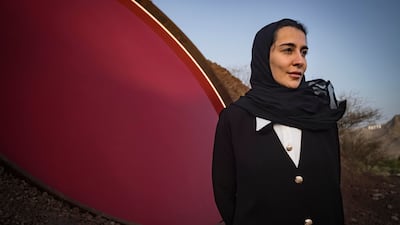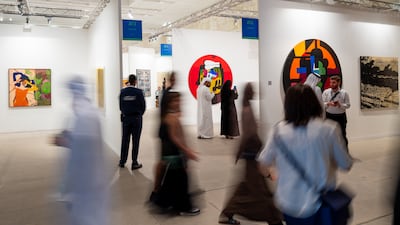The number of exhibitors taking part in Abu Dhabi Art fair in November has surged by 40 per cent compared to last year, as the event goes from strength to strength.
More than 140 galleries from 37 countries will be represented, a record for the annual fair that was first held in 2009. Cultural space Manarat Al Saadiyat will once again host the event, which runs from November 19 to 23.
The increase in the number of galleries “reflects Abu Dhabi’s rising stature in both institutional and private collecting circles”, said the Department of Culture and Tourism – Abu Dhabi, which is organising the event.
“Over the years, the fair has evolved into the region’s most influential platform for art and ideas, a cultural moment where the UAE’s pioneering spirit engages with the global art community,” said Mohamed Khalifa Al Mubarak, the chairman of DCT – Abu Dhabi.
“The upcoming edition of Abu Dhabi Art fair promises to be the most ambitious yet, featuring a record number of galleries from around the world.”
This year, the event will spotlight the art scenes in Nigeria, Turkey and the Gulf. Galleries from several other countries, including Algeria, Senegal, Netherlands, Peru and Tanzania, will make their debuts.
Galleries presenting leading Gulf artists include Gallery Isabelle (Hassan Sharif, Mohammed Kazem and Alia Zaal); Wusum Gallery (Tarek Darwish); Hunna Art (Alymamah Rashed, Joud Fahmy and Zayn Qahtani); Sapar Contemporary (Rashid Al Khalifa); Iris Projects (Nasser Al Salem, Juma Al Haj and Shamsa Al Omaira); Hafez Gallery (Sami Al Marzoogi, Sara Alabdali and Raeda Ashour) and Albareh Art Gallery (Nasser Al Yousif).
“Our curatorial focus continues to centre on under-represented art histories and foster equity in global art narratives through the platform of the fair,” said Dyala Nusseibeh, director of Abu Dhabi Art.
Emirati artist Shaikha Al Mazrou, a notable figure in the country’s contemporary art scene, was tasked with creating Abu Dhabi Art Fair's “visual identity”.
Her 2023 work, Beyond All Measures, will be among the highlights at the fair. Using oxidised brass, it depicts the horizon while exploring its symbolism as a threshold and point of transformation.
“Shaikha has become one of the most successful artists of her generation in the UAE,” Nusseibeh said in April. “The series we have chosen to work with for the visual campaign and visual feel of the fair offers an exploration of materiality and a repurposing of discarded matter from fabrication sites in the UAE.”
COMPANY%20PROFILE
%3Cp%3E%3Cstrong%3EName%3A%20%3C%2Fstrong%3EKinetic%207%3Cbr%3E%3Cstrong%3EStarted%3A%3C%2Fstrong%3E%202018%3Cbr%3E%3Cstrong%3EFounder%3A%3C%2Fstrong%3E%20Rick%20Parish%3Cbr%3E%3Cstrong%3EBased%3A%3C%2Fstrong%3E%20Abu%20Dhabi%2C%20UAE%3Cbr%3E%3Cstrong%3EIndustry%3A%3C%2Fstrong%3E%20Clean%20cooking%3Cbr%3E%3Cstrong%3EFunding%3A%3C%2Fstrong%3E%20%2410%20million%3Cbr%3E%3Cstrong%3EInvestors%3A%3C%2Fstrong%3E%20Self-funded%3C%2Fp%3E%0A
Wicked: For Good
Director: Jon M Chu
Starring: Ariana Grande, Cynthia Erivo, Jonathan Bailey, Jeff Goldblum, Michelle Yeoh, Ethan Slater
Rating: 4/5
more from Janine di Giovanni
Superliminal%20
%3Cp%3EDeveloper%3A%20Pillow%20Castle%20Games%0D%3Cbr%3EPublisher%3A%20Pillow%20Castle%20Games%0D%3Cbr%3EConsole%3A%20PlayStation%204%26amp%3B5%2C%20Xbox%20Series%20One%20%26amp%3B%20X%2FS%2C%20Nintendo%20Switch%2C%20PC%20and%20Mac%0D%3Cbr%3ERating%3A%204%2F5%3C%2Fp%3E%0A
MATCH INFO
Day 1 at Mount Maunganui
England 241-4
Denly 74, Stokes 67 not out, De Grandhomme 2-28
New Zealand
Yet to bat
COMPANY%20PROFILE%20
%3Cp%3E%3Cstrong%3ECompany%20name%3A%20%3C%2Fstrong%3ETerra%3Cbr%3E%3Cstrong%3EStarted%3A%3C%2Fstrong%3E%202021%3Cbr%3E%3Cstrong%3EBased%3A%3C%2Fstrong%3E%20Dubai%3Cbr%3E%3Cstrong%3EFounder%3A%3C%2Fstrong%3E%20Hussam%20Zammar%3Cbr%3E%3Cstrong%3ESector%3A%3C%2Fstrong%3E%20Mobility%3Cbr%3E%3Cstrong%3EInvestment%20stage%3A%3C%2Fstrong%3E%20Pre-seed%20funding%20of%20%241%20million%3Cbr%3E%3C%2Fp%3E%0A
What is graphene?
Graphene is extracted from graphite and is made up of pure carbon.
It is 200 times more resistant than steel and five times lighter than aluminum.
It conducts electricity better than any other material at room temperature.
It is thought that graphene could boost the useful life of batteries by 10 per cent.
Graphene can also detect cancer cells in the early stages of the disease.
The material was first discovered when Andre Geim and Konstantin Novoselov were 'playing' with graphite at the University of Manchester in 2004.
8 traditional Jamaican dishes to try at Kingston 21
- Trench Town Rock: Jamaican-style curry goat served in a pastry basket with a carrot and potato garnish
- Rock Steady Jerk Chicken: chicken marinated for 24 hours and slow-cooked on the grill
- Mento Oxtail: flavoured oxtail stewed for five hours with herbs
- Ackee and salt fish: the national dish of Jamaica makes for a hearty breakfast
- Jamaican porridge: another breakfast favourite, can be made with peanut, cornmeal, banana and plantain
- Jamaican beef patty: a pastry with ground beef filling
- Hellshire Pon di Beach: Fresh fish with pickles
- Out of Many: traditional sweet potato pudding
More from Neighbourhood Watch
Silent Hill f
Publisher: Konami
Platforms: PlayStation 5, Xbox Series X/S, PC
Rating: 4.5/5
The biog
Name: Abeer Al Bah
Born: 1972
Husband: Emirati lawyer Salem Bin Sahoo, since 1992
Children: Soud, born 1993, lawyer; Obaid, born 1994, deceased; four other boys and one girl, three months old
Education: BA in Elementary Education, worked for five years in a Dubai school
Specs
Engine: 51.5kW electric motor
Range: 400km
Power: 134bhp
Torque: 175Nm
Price: From Dh98,800
Available: Now
Race%20card
%3Cp%3E6pm%3A%20Al%20Maktoum%20Challenge%20Round%201%20%E2%80%93%20Group%201%20(PA)%20%2450%2C000%20(Dirt)%201%2C600m%3Cbr%3E6.35pm%3A%20Dubai%20Racing%20Club%20Classic%20%E2%80%93%20Handicap%20(TB)%20%24100%2C000%20(D)%202%2C410m%3Cbr%3E7.10pm%3A%20Dubawi%20Stakes%20%E2%80%93%20Group%203%20(TB)%20%24150%2C000%20(D)%201%2C200m%3Cbr%3E7.45pm%3A%20Jumeirah%20Classic%20Trial%20%E2%80%93%20Conditions%20(TB)%20%24150%2C000%20(Turf)%201%2C400m%3Cbr%3E8.20pm%3A%20Al%20Maktoum%20Challenge%20Round%201%20%E2%80%93%20Group%202%20(TB)%20%24250%2C000%20(D)%201%2C600m%3Cbr%3E8.55pm%3A%20Al%20Fahidi%20Fort%20%E2%80%93%20Group%202%20(TB)%20%24180%2C000%20(T)%201%2C400m%3Cbr%3E9.30pm%3A%20Ertijaal%20Dubai%20Dash%20%E2%80%93%20Listed%20(TB)%20%24100%2C000%20(T)%201%2C000m%3C%2Fp%3E%0A
UAE currency: the story behind the money in your pockets
UAE currency: the story behind the money in your pockets
Why seagrass matters
- Carbon sink: Seagrass sequesters carbon up to 35X faster than tropical rainforests
- Marine nursery: Crucial habitat for juvenile fish, crustations, and invertebrates
- Biodiversity: Support species like sea turtles, dugongs, and seabirds
- Coastal protection: Reduce erosion and improve water quality
Brief scoreline:
Manchester United 2
Rashford 28', Martial 72'
Watford 1
Doucoure 90'
Specs
Engine: Dual-motor all-wheel-drive electric
Range: Up to 610km
Power: 905hp
Torque: 985Nm
Price: From Dh439,000
Available: Now
AndhaDhun
Director: Sriram Raghavan
Producer: Matchbox Pictures, Viacom18
Cast: Ayushmann Khurrana, Tabu, Radhika Apte, Anil Dhawan
Rating: 3.5/5
UAE currency: the story behind the money in your pockets
Drivers’ championship standings after Singapore:
1. Lewis Hamilton, Mercedes - 263
2. Sebastian Vettel, Ferrari - 235
3. Valtteri Bottas, Mercedes - 212
4. Daniel Ricciardo, Red Bull - 162
5. Kimi Raikkonen, Ferrari - 138
6. Sergio Perez, Force India - 68
Confirmed%20bouts%20(more%20to%20be%20added)
%3Cp%3ECory%20Sandhagen%20v%20Umar%20Nurmagomedov%0D%3Cbr%3ENick%20Diaz%20v%20Vicente%20Luque%0D%3Cbr%3EMichael%20Chiesa%20v%20Tony%20Ferguson%0D%3Cbr%3EDeiveson%20Figueiredo%20v%20Marlon%20Vera%0D%3Cbr%3EMackenzie%20Dern%20v%20Loopy%20Godinez%0D%3Cbr%3E%3C%2Fp%3E%0A%3Cp%3ETickets%20for%20the%20August%203%20Fight%20Night%2C%20held%20in%20partnership%20with%20the%20Department%20of%20Culture%20and%20Tourism%20Abu%20Dhabi%2C%20went%20on%20sale%20earlier%20this%20month%2C%20through%20www.etihadarena.ae%20and%20www.ticketmaster.ae.%0D%3Cbr%3E%3C%2Fp%3E%0A
Company profile
Company name: Dharma
Date started: 2018
Founders: Charaf El Mansouri, Nisma Benani, Leah Howe
Based: Abu Dhabi
Sector: TravelTech
Funding stage: Pre-series A
Investors: Convivialite Ventures, BY Partners, Shorooq Partners, L& Ventures, Flat6Labs
Six tips to secure your smart home
Most smart home devices are controlled via the owner's smartphone. Therefore, if you are using public wi-fi on your phone, always use a VPN (virtual private network) that offers strong security features and anonymises your internet connection.
Keep your smart home devices’ software up-to-date. Device makers often send regular updates - follow them without fail as they could provide protection from a new security risk.
Use two-factor authentication so that in addition to a password, your identity is authenticated by a second sign-in step like a code sent to your mobile number.
Set up a separate guest network for acquaintances and visitors to ensure the privacy of your IoT devices’ network.
Change the default privacy and security settings of your IoT devices to take extra steps to secure yourself and your home.
Always give your router a unique name, replacing the one generated by the manufacturer, to ensure a hacker cannot ascertain its make or model number.
UAE%20v%20West%20Indies
%3Cp%3EFirst%20ODI%20-%20Sunday%2C%20June%204%20%0D%3Cbr%3ESecond%20ODI%20-%20Tuesday%2C%20June%206%20%0D%3Cbr%3EThird%20ODI%20-%20Friday%2C%20June%209%26nbsp%3B%3C%2Fp%3E%0A%3Cp%3EMatches%20at%20Sharjah%20Cricket%20Stadium.%20All%20games%20start%20at%204.30pm%0D%3Cbr%3E%0D%3Cbr%3E%3Cstrong%3EUAE%20squad%3C%2Fstrong%3E%0D%3Cbr%3EMuhammad%20Waseem%20(captain)%2C%20Aayan%20Khan%2C%20Adithya%20Shetty%2C%20Ali%20Naseer%2C%20Ansh%20Tandon%2C%20Aryansh%20Sharma%2C%20Asif%20Khan%2C%20Basil%20Hameed%2C%20Ethan%20D%E2%80%99Souza%2C%20Fahad%20Nawaz%2C%20Jonathan%20Figy%2C%20Junaid%20Siddique%2C%20Karthik%20Meiyappan%2C%20Lovepreet%20Singh%2C%20Matiullah%2C%20Mohammed%20Faraazuddin%2C%20Muhammad%20Jawadullah%2C%20Rameez%20Shahzad%2C%20Rohan%20Mustafa%2C%20Sanchit%20Sharma%2C%20Vriitya%20Aravind%2C%20Zahoor%20Khan%0D%3C%2Fp%3E%0A
Dust and sand storms compared
Sand storm
- Particle size: Larger, heavier sand grains
- Visibility: Often dramatic with thick "walls" of sand
- Duration: Short-lived, typically localised
- Travel distance: Limited
- Source: Open desert areas with strong winds
Dust storm
- Particle size: Much finer, lightweight particles
- Visibility: Hazy skies but less intense
- Duration: Can linger for days
- Travel distance: Long-range, up to thousands of kilometres
- Source: Can be carried from distant regions
Scoreline:
Barcelona 2
Suarez 85', Messi 86'
Atletico Madrid 0
Red card: Diego Costa 28' (Atletico)
The specs: 2018 Peugeot 5008
Price, base / as tested: Dh99,900 / Dh134,900
Engine: 1.6-litre turbocharged four-cylinder
Transmission: Six-speed automatic
Power: 165hp @ 6,000rpm
Torque: 240Nm @ 1,400rpm
Fuel economy, combined: 5.8L / 100km
Persuasion
%3Cp%3E%3Cstrong%3EDirector%3A%20%3C%2Fstrong%3ECarrie%20Cracknell%C2%A0%3C%2Fp%3E%0A%3Cp%3E%3Cstrong%3EStars%3A%20%3C%2Fstrong%3EDakota%20Johnson%2C%20Cosmo%20Jarvis%2C%20Richard%20E%20Grant%2C%20Henry%20Golding%20and%20Nikki%20Amuka-Bird%3C%2Fp%3E%0A%3Cp%3E%3Cstrong%3ERating%3A%3C%2Fstrong%3E%201.5%2F5%3C%2Fp%3E%0A
HEADLINE HERE
- I would recommend writing out the text in the body
- And then copy into this box
- It can be as long as you link
- But I recommend you use the bullet point function (see red square)
- Or try to keep the word count down
- Be wary of other embeds lengthy fact boxes could crash into
- That's about it
AL%20BOOM
%3Cp%20style%3D%22text-align%3Ajustify%3B%22%3E%26nbsp%3B%26nbsp%3B%26nbsp%3BDirector%3AAssad%20Al%20Waslati%26nbsp%3B%3C%2Fp%3E%0A%3Cp%20style%3D%22text-align%3Ajustify%3B%22%3E%0DStarring%3A%20Omar%20Al%20Mulla%2C%20Badr%20Hakami%20and%20Rehab%20Al%20Attar%0D%3Cbr%3E%0D%3Cbr%3EStreaming%20on%3A%20ADtv%0D%3Cbr%3E%0D%3Cbr%3ERating%3A%203.5%2F5%0D%3Cbr%3E%0D%3Cbr%3E%3C%2Fp%3E%0A
Killing of Qassem Suleimani










